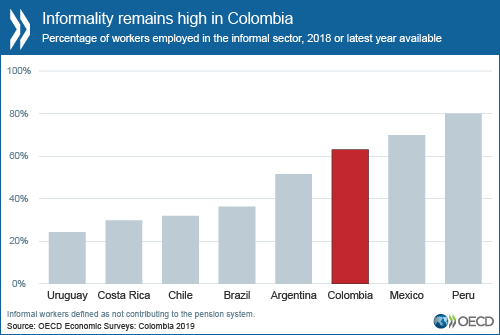Colombia's economy is resilient and appears well equipped to navigate a challenging external environment dominated by protectionism and uncertainty, but it must pursue new reforms to make growth stronger and more inclusive, according to a new report from the OECD.
The latest OECD Economic Survey of Colombia discusses how boosting productivity through new structural reforms can help the country create new high-quality jobs, draw more advantages from greater integration with the global economy and continue the convergence process with OECD countries. The Survey projects the Colombian economy will remain resilient, with growth of around 3.4% this year and 3.5% next, but cautions that trade tensions, geopolitical uncertainties and weaker advanced economies are important downside risks.
The Survey, presented in Bogota by OECD Secretary-General Angel Gurría, alongside Colombian President Iván Duque, Colombian Vice-President Marta Lucía Ramírez and Minister of Finance and Public Credit Alberto Carrasquilla, discusses the need to boost productivity, improve social policy and make exports an engine for both growth and the creation of high-quality jobs.
"Colombia has made tremendous economic and social progress, driven by impressive reforms that have created a solid macroeconomic framework and set the basis for the future," Mr Gurría said. "The challenge facing policymakers today is to put the economy on a path to stronger and more inclusive growth, with the benefits shared among more Colombians. Courageous structural reforms will help Colombia converge with OECD living standards, reach its potential and achieve a more inclusive economy."
The Survey points out that further advances in living standards will hinge on reforms to reinvigorate productivity growth, which has stagnated in the last decade and is low by Latin American standards. Reforms should seek to reduce regulatory burdens, increase competition, quicken digital transformation and boost innovation, notably through greater support for R&D.
To help Colombia meet its untapped export potential, the government should seek to reduce tariffs and the scope of non-tariff barriers to trade, continue improvements to infrastructure, customs and logistics services and allow greater competition in key sectors, such as transport, which would improve competitiveness. Further support for entrepreneurship and greater access to finance will also be fundamental.
 Colombia has seen some success in reducing its high levels of labour market informality, but more must be done to ensure that government policies promote both formal employment and inclusiveness. Continuing the reduction of non-wage labour costs, which are among the highest in Latin America, will be key. Decreasing firms' registration costs and simplifying the registration of workers to social security would facilitate formalisation of firms and jobs. Reviewing the minimum wage could help achieve a more job-friendly wage level.
Colombia has seen some success in reducing its high levels of labour market informality, but more must be done to ensure that government policies promote both formal employment and inclusiveness. Continuing the reduction of non-wage labour costs, which are among the highest in Latin America, will be key. Decreasing firms' registration costs and simplifying the registration of workers to social security would facilitate formalisation of firms and jobs. Reviewing the minimum wage could help achieve a more job-friendly wage level.
Improving the quality and relevance of education and training will also be critical for Colombian efforts to prepare workers for high-quality formal employment. Colombia needs to prioritise early-childhood and basic education, particularly in rural areas, as well as the provision of quality teaching staff. More can be done to ensure that the vocational training system provides adequate skills enabling workers to enter formal employment and break out of poverty, the Survey said.
To ensure sound public finances while creating space for dealing with potential future shocks, Colombian macroeconomic policy will need to strike an appropriate balance, the Survey said. This should include gradual reduction in the budget deficit, to 1% of GDP by 2022, in line with the fiscal rule, coupled with targeted social policies aimed at reducing inequality and poverty.
Further tax reforms should seek to improve redistribution, raise revenues and improve the tax mix. Broadening the bases of personal and value-added taxes, reducing the corporate tax rate and eliminating its numerous tax exemptions should be considered. Further revenue could come from environmental taxes and from strengthening tax administrations to reduce tax evasion.
Reforms to the pension system will be necessary to reduce old-age poverty and ensure sustainability.
A snapshot of the Economic Survey of Colombia, with the main conclusions, is accessible at: http://www.oecd.org/economy/colombia-economic-snapshot/.






